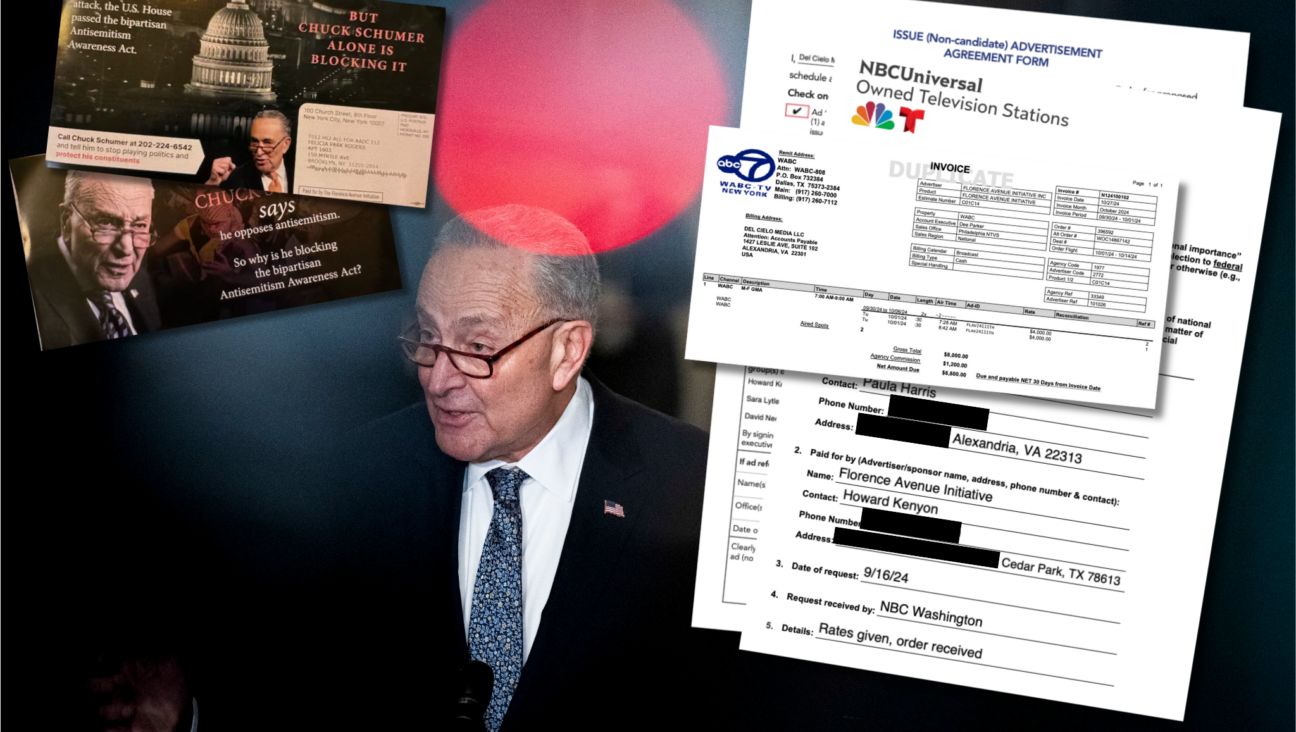This obscure rule explains Biden’s approach to antisemitism
Biden maintained a Trump-era executive order addressing campus antisemitism, but never fully implemented it — embodying an often muddled approach on the issue

President Joe Biden speaks at the White House Hanukkah party on Dec. 16. While Biden prioritized the fight against antisemitism, his administration punted on some of the thorniest questions about the line between legitimate political speech and bigotry. Photo by Getty Images
President Joe Biden launched his 2020 campaign by lambasting then-President Donald Trump’s response to far-right antisemitism, swore in the first ambassador-level envoy to combat antisemitism, and created the first White House national strategy to counter it.
But buried in the annals of the Office of Information and Regulatory Affairs is an icon of how his team struggled to convince Americans that Democrats are best suited to protect Jews against hate.
Its official title is Department of Education Rule 1870-AA15, and it was never implemented.
The rule follows a 2019 executive order signed by Trump mandating that the department use the International Holocaust Remembrance Alliance’s definition of antisemitism when investigating claims of discrimination against Jewish students.
The definition is controversial because it classifies most anti-Zionism as inherently antisemitic. That has divided mainstream Jewish leaders and many Democrats.
“This executive order was designed to counter a slippery slope where freedom of speech and protests turn into antisemitism,” Seth Limmer, a prominent Chicago rabbi, told The New York Times at the time. “But I’m a big believer that if you stifle a protest, it’s not going to stifle the protest.”
The core of the question is whether protests against Israel include enough antisemitism to warrant restrictions. Trump and other Republican leaders think so — that was the heart of the executive order, and the ensuing Education Department rule, which is required to convert the order into policy that its civil rights team can use day-to-day.
But Democrats have been divided on the question of where anti-Zionism and antisemitism overlap. And that’s how Rule 1870-AA15 ended up in limbo. Biden never rescinded the executive order — but neither has his administration moved to implement it. For years, senior officials have said they were just about to finalize the rule.
“I resist the ‘delay’ phrase,” Catherine Lhamon, the department’s civil rights chief, told me and other Jewish journalists in February. “We are working every day to be able to move it.”
But with 27 days left until Biden leaves office, it seems unlikely any action will be taken. That is a policy choice in itself — albeit one that is hard to explain to American Jews demanding to know what you’re doing to address antisemitism.
If Biden thought there were problems with Trump’s executive order, he could have rescinded it and issued a new one that reflected his vision for where to draw the line between legitimate protest and antisemitic bigotry.
As it stands, he can neither take credit for an aggressive approach to campus antisemitism, nor claim a principled alternative stance that carved out more room for criticism of Israel. It was a similar story with the national antisemitism strategy, which equivocated on how to define antisemitism in a way that seemed to genuinely please almost nobody.
Biden’s own team seemed divided on these questions. Ambassador Deborah Lipstadt, his antisemitism envoy, convinced 39 foreign countries to rely on the IHRA definition even as her own government dragged its feet implementing it at home.
Second Gentleman Doug Emhoff, the administration’s senior Jewish surrogate, never spoke clearly about his position on the intersection of Israel and antisemitism. And in Congress, Senate Majority Leader Chuck Schumer pointedly refused to advance the Antisemitism Awareness Act, which endorsed IHRA — and then had a sudden change of heart after the election only for Republicans to stymie his efforts.
The impossibility of pinning down the “Democratic position” on antisemitism almost certainly allowed Republicans an opportunity to seize the issue for themselves. Of course, it’s always easier to speak with clear-eyed conviction when you’re in the opposition.
Trump, of course, didn’t manage to finalize the Education Department rule the first time he was in office, either. I’ll be watching to see whether it gets implemented after he is sworn in for a second term — and whether the Republicans remain unified on their approach to antisemitism.
A message from our Publisher & CEO Rachel Fishman Feddersen

I hope you appreciated this article. Before you go, I’d like to ask you to please support the Forward’s award-winning, nonprofit journalism so that we can be prepared for whatever news 2025 brings.
At a time when other newsrooms are closing or cutting back, the Forward has removed its paywall and invested additional resources to report on the ground from Israel and around the U.S. on the impact of the war, rising antisemitism and polarized discourse.
Readers like you make it all possible. Support our work by becoming a Forward Member and connect with our journalism and your community.
— Rachel Fishman Feddersen, Publisher and CEO























